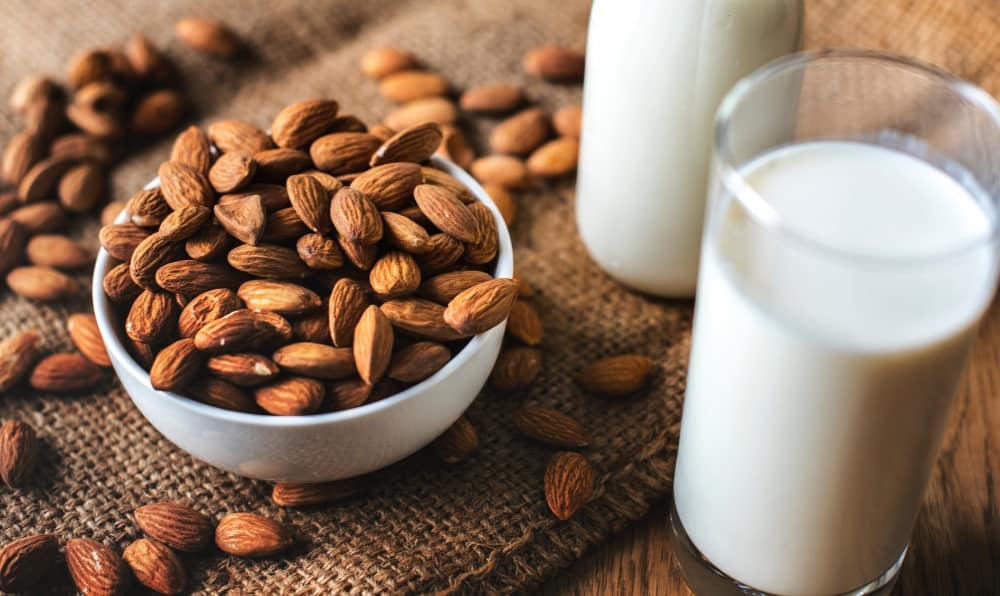Are you afraid of hormones in the milk? Yes? Then you’re not alone.
Like many other foods before, milk has also become a victim of pseudo-scientific anxiety – especially the hormone content and its claimed effect of causing cancer.
But how much truth is behind these claims? What are the effects of hormones in milk? Here are 6 truths about hormones in the milk that will clarify everything you need to know
6 Facts about the Effect of Hormones in Milk
Fact # 1: Bovine growth hormone has no biological activity in humans
Growth hormone – the mere thought of his presence in an innocent glass of milk is already enough for many people to turn away from it and try to persuade other people to do the same. But is there really something to be afraid of?
No, because even though cow’s milk actually contains small amounts of growth hormone, it has no relevance: cows’ growth hormones are not biologically active in the human organism.
Bovine growth hormone (bGH, also called bovine somatotropin (bST)) is a so-called peptide hormone. That means it’s made up of amino acids, just like any other protein we eat and digest. There are no studies that suggest that milk growth hormones would survive human digestion or that their fragments would develop any biological activity in the human body.
In fact, there is nothing that would suggest that bovine growth hormones have any effect on our own human growth hormone receptors.
It may help if you know that growth hormones in the milk are not there to help the calf grow faster. The hormone is in cow’s milk for the same reason, which is why it is in human breast milk because there is passive transport from the blood to the milk.
The tiny amounts of bGH in milk have no effect on the calf at all because although its growth is at least partially dependent on growth hormone (and IGF-1), milk is not the main source of it; the calf itself produces much larger amounts of it in its pituitary gland.
Fact # 2: Milk contains no IGF-1
IGF-1 (insulin-like growth factor 1) is a peptide hormone, a growth hormone, but the two are not the same. IGF-1 is produced by the liver in response to growth hormone secretion of the pituitary gland, and many of the growth hormone functions are then mediated by IGF-1.
Although there is a link between IGF-1 levels in the blood and the development of certain types of cancer (we will look at later), the fear of IGF-1 in milk is unfounded. Studies have shown that ingesting IGF-1 from cow’s milk has no detectable biological effect in the human organism – just like growth hormones – even though IGF-1 from cows is identical to human IGF-1.
This may be related simply to the fact that the concentration of IGF-1 in milk is much lower than in our own digestive juices present in our gastrointestinal tract. The amount of IGF-1 in cow’s milk is about equal to that in human breast milk and is much lower than its own daily production by the liver.
The concentration in our blood is about 100 times higher than in milk. In other words, if a baby was to drink 1.5 liters of cow’s milk a day the amount of IGF-1 would increase, but still, account for only about 1% of his own daily production. The amount of IGF-1 in the milk is simply too low to be of any relevance.
As a parent, you may be more worried about exposing the child to anything that can lead to concern about those tiny amounts of hormones and then resorting to another baby formula. Of course, this concern is understandable, but there is absolutely no reason for it because even though IGF-1 is more resistant to heat than bGH, it is still broken down by the special heat treatment that infant formula must endure.
Fact # 3: Soy protein causes your IGF-1 levels to rise faster than the milk does
Even if milk contains no relevant amounts of IGF-1, the hormone level still rises after consuming milk. An increase of only 14 micrograms per liter of blood (which already contains between 135 and 600 micrograms), but nonetheless an increase. However, this type of increase in circulating IGF-1 is not a unique feature of milk drinking. There are a number of foods that increase your own IGF-1 production.
An intervention study from 2011 showed that a daily intake of 50g of soy protein increases IGF-1 levels by 21 micrograms per liter. Since soy contains no IGF-1 at all, the increase must result from stimulating the body’s secretion.
In general, it seems that our own IGF-1 production is dependent on our protein uptake. Whether derived from animal or vegetable sources is irrelevant and it can be assumed that low IGF-1 production is a sign of malnutrition, especially in the elderly. But why are we thinking about IGF-1?
Fact # 4: IGF-1 does not cause cancer
Fundamental misunderstandings of science are the root of most health myths. When it comes to disease, the most prominent example of myths is that complex disease patterns have a single cause. Many believe that diabetes is triggered by the intake of sugar (or just carbohydrates), that salt is the cause of high blood pressure and that causes IGF-1 cancer. But cancer – like all the examples just mentioned – is a multifactorial disease and every type of cancer is likely to be triggered by a variety of interrelated factors.
So if someone claims that one thing – for example, growth hormone IGF-1 is the cause of cancer – that’s always wrong.
What we do know is that high levels of IGF-1 in the blood may increase the risk of cancer (in the prostate) – but not cancer in general. That high IGF-1 levels may trigger a single type of cancer is a hypothesis, but not a fact, and under all circumstances, a growth factor like this would only play a role in a complex confluence of factors.
Most claims that IGF-1 is the primary trigger for any type of cancer are based on cell studies that are never used to explain causes and effects in the complex interactions of the human body.
In the end, we should be more interested in whether certain foods increase the risk of cancer and not whether certain ingredients do so in isolation or in a petri dish. Before I describe what we actually know about the connection between milk and cancer, let’s take a quick look at one last group of milk hormones: the estrogens.
Fact # 5: Milk does not increase your estrogen levels
bGH and IGF-1 are not the only hormones that cause people to be afraid of milk. Much of the milk we drink comes from cows who are pregnant – and like us humans, that means that the blood levels of estrogen are higher than normal.
Since what happens in the milk reflects what happens in the animal’s or human’s blood, a cow’s milk in the third trimester of pregnancy contains about 20 times as much estrogen as that of a non-pregnant cow. But as you may have noticed so far, “20 times as much” does not really mean anything.
A new study in mice has tested whether the levels of estrogen in normal milk, pregnant cows, had an effect on the circulating levels of estrogen in the genitals of the mice.
It did not …
The mice were then given 100 times the amount of estrogen found in the milk samples with the highest scores. Again, nothing happened.
Only by administering 1000 times the highest milk concentration of estrogen did it become possible to have an effect on the blood and genitalia of the animals.
That the liver can effectively break down steroid hormones is also the reason that bodybuilders usually need to inject their steroids and can not take them orally. If they still use oral steroids, then they have been chemically modified to become resistant to degradation in the liver and digestive tract. Therefore, oral steroids also have a toxic effect on the liver and are used only in exceptional cases.
All of these myths about cow’s milk hormones have been created to make you think that milk causes cancer.
If there is really strong evidence that milk increases the overall risk of cancer, it would be online at the beginning of every article. You would see meta-analyses of milk studies that show a clear link between milk and cancer.
But that’s not what we see …
Because milk does not elevate estrogen.
Fact # 6: Milk does not increase the risk of getting cancer
Finding out if there is a connection between special foods and cancer is a lot more difficult than some people imagine. Even if one observes a correlation, it is far from certain that one will cause the other – it could just as well be the other way round.
When it comes to studying what causes cancer, we usually have nothing but observational studies like these that we can relate to. We can not do longitudinal, controlled studies in this field because it would be terribly unethical to actively provoke carcinogenesis in a group of people (and even if we did and see only a small increase in cancer incidence, we would need the study to cancel immediately). So how can we say with certainty that something is causing cancer?
In 1965, Sir Austin Bradford Hill developed a set of criteria that must be met in order to establish causality between a suspected trigger and an effect. And according to Sir Austin, milk would have never gotten the label of causing cancer. It’s just wrong.
Conclusion: Hormones in milk
We finished the topic of hormones in milk, once and for all. There are lots of myths out there when it comes to milk.
But I can ensure you, it does not elevate your estrogen and it will not cause cancer.
Enjoy your glass of milk, and check our Free Ebook with 75 High-Performance Hacks if you like.
Cheers,
Sam






